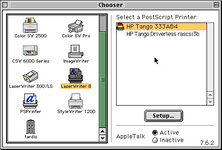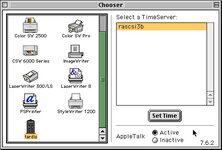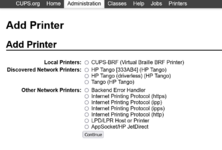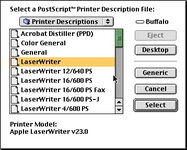slipperygrey
Well-known member
[Crossposting from TinkerDifferent]
While researching Netatalk integration with RaSCSI it struck me just how painful it was to get Netatalk 2.2 working well on a modern Linux distro. For those who are unaware, Netatalk 3.x dropped support for the AppleTalk / DDP protocol in favor of TCP/IP. For us who want to use Netatalk with really quite old Macs (and Apple //e & //gs) Netatalk 2.2 is mandatory. Unfortunately, Netatalk 2.2.6 (which was the last one in the 2.x series) no longer compiles out of the box on modern systems. In addition, there is an outstanding bug that frequently causes it to fail to run on Linux with an error in setifaddr.
As a matter of fact, in the 5 years since the release of Netatalk 2.2.6 an impressive number of forks and projects with their own downstream patchset to keep Netatalk running have emerged. Here are a few of the major ones that I encountered:
All this fragmentation seemed like a huge missed opportunity to me. After a few months of gathering patches and testing, I'm ready to share with you all Netatalk 2.x, the latest and greatest among Netatalk forks!
The way I approached the development process, was to work in relatively atomic PRs against the mainline branch-netatalk-2-2. For one, it gives the community insight into each and every change that has gone into this fork, and secondly, it is keeping the flame and hope alive that we one day can get a mainline Netatalk 2.2.7 release! As such, you may leverage Netatalk PRs on GitHub as the changelog.
A high level changelog summary:
To compile all the bells and whistles for vintage Macs, while disabling features that don't make sense for the same, configure like this:
Afterwards, a 'make install' will install and enable the systemd services, and you can start the 'atalkd' and 'afpd' services. The papd, timelord, and a2boot services are optional and only for those who need printer server, time server, and Apple II netboot functionality, respectively.
I'd love to get feedback and bug reports, if you run into anything! I'm a total noob when it comes to AFP (and C programming) so I may very well have made plenty mistakes!
While researching Netatalk integration with RaSCSI it struck me just how painful it was to get Netatalk 2.2 working well on a modern Linux distro. For those who are unaware, Netatalk 3.x dropped support for the AppleTalk / DDP protocol in favor of TCP/IP. For us who want to use Netatalk with really quite old Macs (and Apple //e & //gs) Netatalk 2.2 is mandatory. Unfortunately, Netatalk 2.2.6 (which was the last one in the 2.x series) no longer compiles out of the box on modern systems. In addition, there is an outstanding bug that frequently causes it to fail to run on Linux with an error in setifaddr.
As a matter of fact, in the 5 years since the release of Netatalk 2.2.6 an impressive number of forks and projects with their own downstream patchset to keep Netatalk running have emerged. Here are a few of the major ones that I encountered:
All this fragmentation seemed like a huge missed opportunity to me. After a few months of gathering patches and testing, I'm ready to share with you all Netatalk 2.x, the latest and greatest among Netatalk forks!
The way I approached the development process, was to work in relatively atomic PRs against the mainline branch-netatalk-2-2. For one, it gives the community insight into each and every change that has gone into this fork, and secondly, it is keeping the flame and hope alive that we one day can get a mainline Netatalk 2.2.7 release! As such, you may leverage Netatalk PRs on GitHub as the changelog.
A high level changelog summary:
- All daemons can run as systemd services. Use the --enable-systemd configure option.
- Printer server: Better compatibility with Apple LaserWriter 7 and 8 drivers on Mac OS and GS/OS (special thanks to @NJRoadfan and the A2SERVER team!)
- The Timelord daemon can now run on modern systems. (special thanks to @cheesestraws for the patch!)
- Apple II: Better compatibility with Asante and Dayna network bridges
- Apple II: Retain folder dates when copying on GS/OS
- Support both Linux and NetBSD FIRSTNET behavior, which caused errors like "setifaddr: eth0 (1-65534): Invalid argument. try specifying a smaller net range"
- Add support for OpenSSL 1.1, while retaining backwards compatibility with OpenSSL 1.0
- Make it possible to compile with LDAP support
- Make it possible to disable AppleTalk session tickles, and other improvements for better support for AppleTalk 58 and earlier
- Resolved a large number of autoconf bootstrap and compiler warnings and errors (gcc 10)
To compile all the bells and whistles for vintage Macs, while disabling features that don't make sense for the same, configure like this:
./configure --enable-systemd --enable-ddp --enable-a2boot --enable-cups --enable-timelord --enable-zeroconf --disable-quota --sysconfdir=/etc --with-uams-path=/usr/lib/netatalkAfterwards, a 'make install' will install and enable the systemd services, and you can start the 'atalkd' and 'afpd' services. The papd, timelord, and a2boot services are optional and only for those who need printer server, time server, and Apple II netboot functionality, respectively.
I'd love to get feedback and bug reports, if you run into anything! I'm a total noob when it comes to AFP (and C programming) so I may very well have made plenty mistakes!
Last edited by a moderator:




